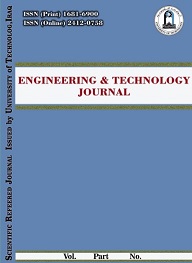Abstract
It is hoped in this paper to use the concept of centrifuging to prepare thick hollow functionally graded cylinder of (Al-TiO2) alloy. In order to achieve this objective, a vertical centrifugal casting machine was designed and manufactured. The FG cylinders prepared have shown a reasonable linear and the graded hardness value across the thicknesses. FG cylinders exhibit a heterogeneous microstructure in which a high volume fraction of (TiO2) hard particles is clustered on the surface according to the value of pouring temperature and motor force that represented by the mold number of rotations per minutes. It was found that using of pouring temperature of
(850˚C) and rotation speed of (2100 r.p.m) would make a better graded hardness
value across the thickness especially when (TiO2 weight%) is (10%). It is also found
that the clustering of (TiOR2R) will weaken the tensile strength of prepared materials but
increasing the wear resistance. Results of X-ray diffraction analysis for cylinders
prepared with pouring temperature conditions (850˚C) and rotation speed of (2100
r.p.m)shows the development of (TiAl) crystalline phase in all prepared FG cylinders
and maximum noticeable intensity was foundin (7.5weight% of TiOR2R) FG cylinders.
(850˚C) and rotation speed of (2100 r.p.m) would make a better graded hardness
value across the thickness especially when (TiO2 weight%) is (10%). It is also found
that the clustering of (TiOR2R) will weaken the tensile strength of prepared materials but
increasing the wear resistance. Results of X-ray diffraction analysis for cylinders
prepared with pouring temperature conditions (850˚C) and rotation speed of (2100
r.p.m)shows the development of (TiAl) crystalline phase in all prepared FG cylinders
and maximum noticeable intensity was foundin (7.5weight% of TiOR2R) FG cylinders.
Keywords
and Mechanical characteristics
Functionally graded cylinder
Vertical centrifugal casting
